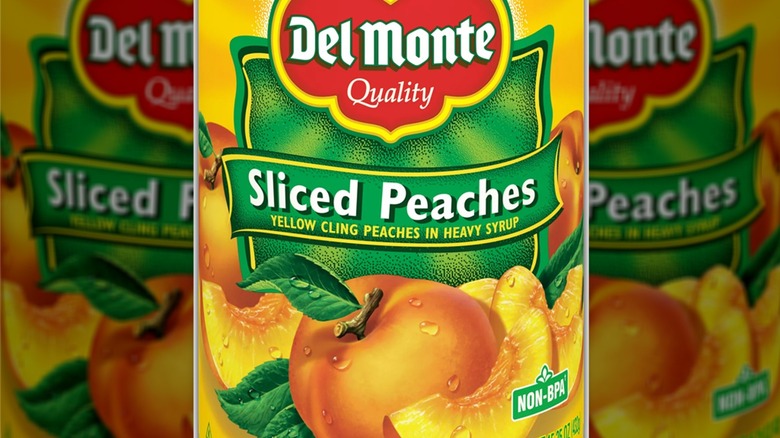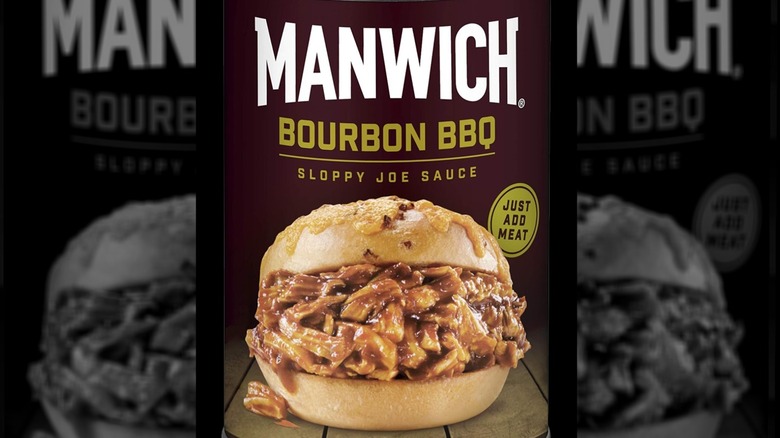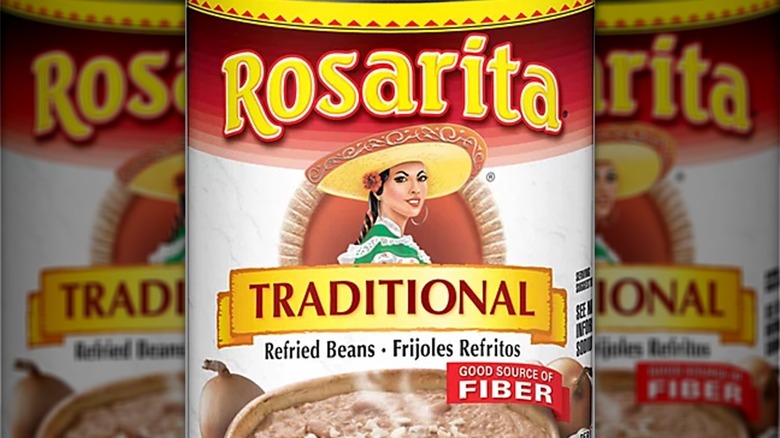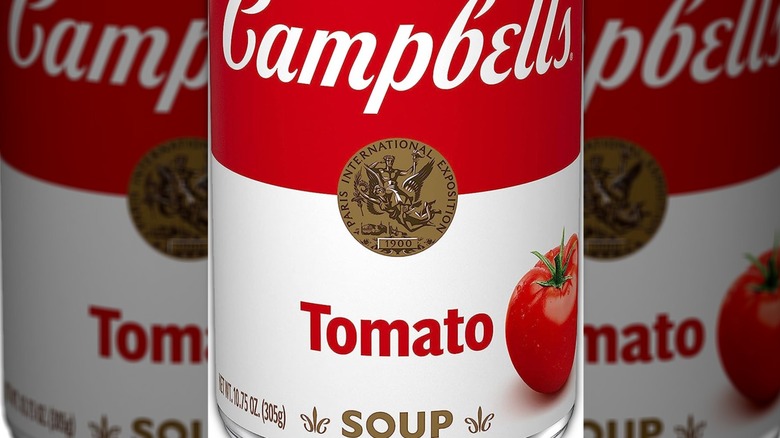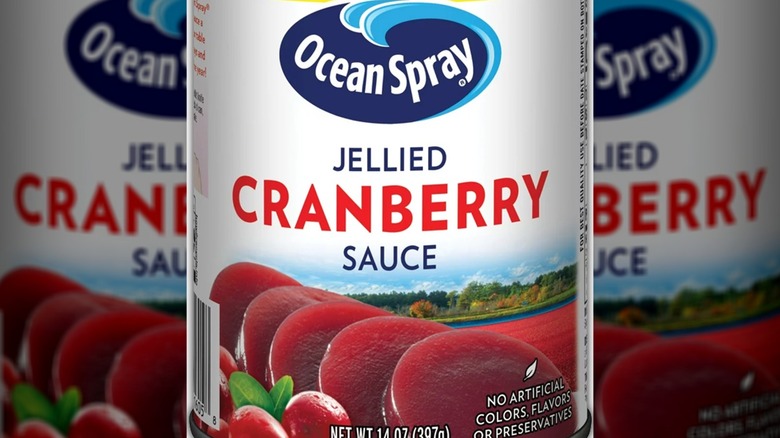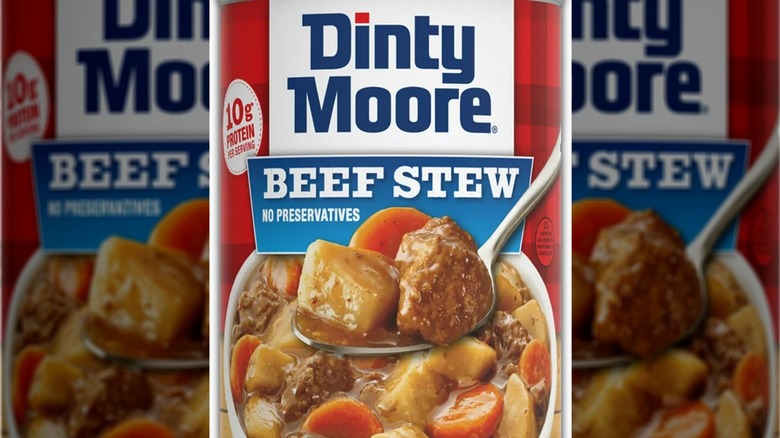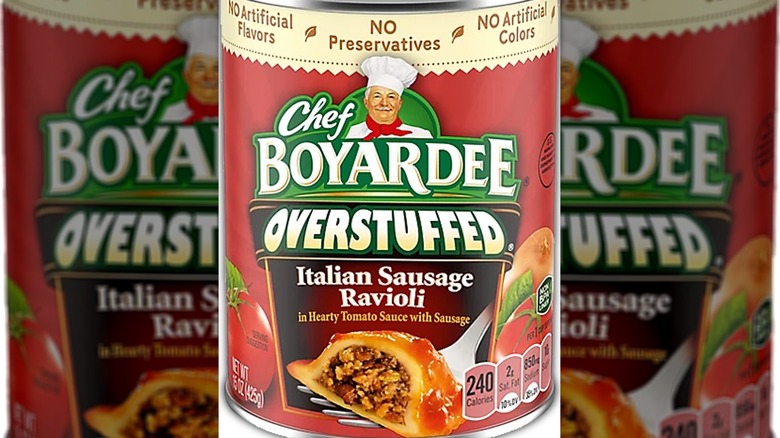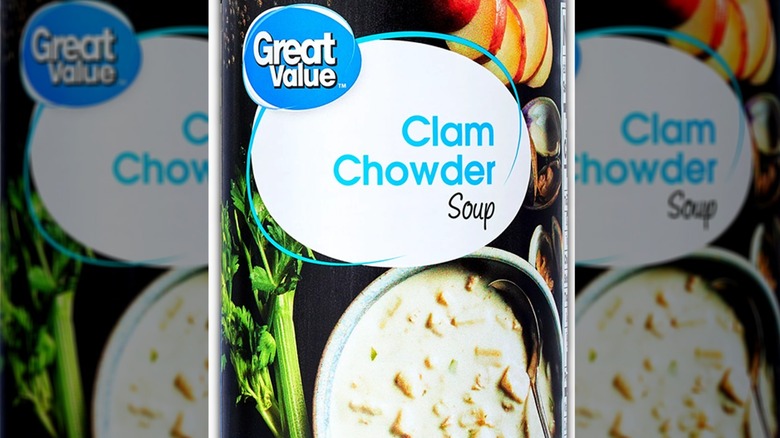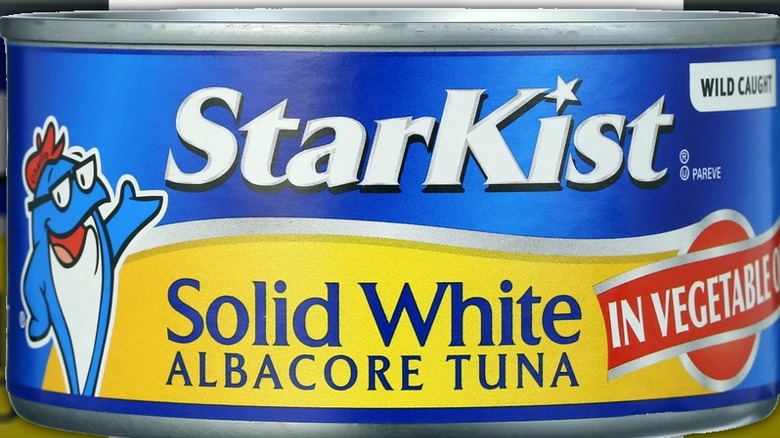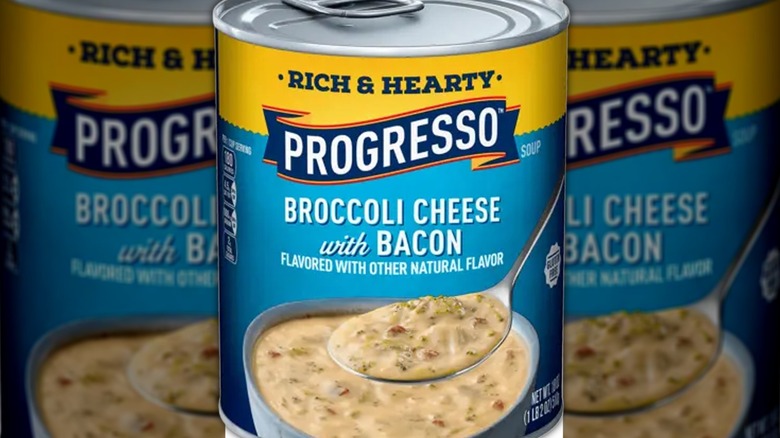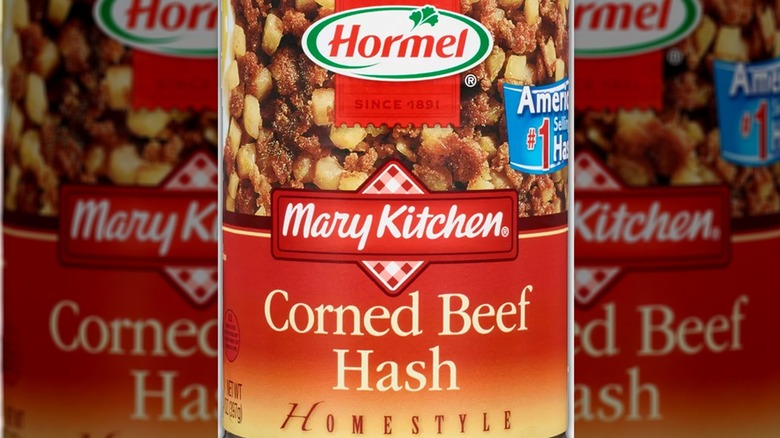13 Of The Unhealthiest Store-Bought Canned Foods
We may receive a commission on purchases made from links.
What are the health concerns related to canned foods? Such a question might arise while navigating the canned goods aisle during your weekly grocery shop. Upon closer examination of the nutritional labels, one common issue that emerges is the high sodium content found in many of these products, which can increase blood pressure and lead to other heart-related issues. Also, the high amounts of saturated and trans fats can be a problem as they can raise cholesterol levels, increasing the risk of heart disease.
When it comes to ingredients, many canned foods use preservatives and additives to improve taste and texture, or for preservation techniques. However, some of these additives might not be the best for our health. Also, vague terms on the ingredient list like "flavoring" or "natural flavor" can hide more processed or artificial ingredients that might not be good for a healthy diet. Some canned foods also include common allergens like soy, wheat, and dairy, which could be a problem for people with allergies or food sensitivities.
Lastly, canned seafood products sometimes have mercury and other unwanted substances. There's also a noticeable lack of essential nutrients in some canned goods, even if they provide a good amount of protein. And, the high-calorie content in some of these products could lead to overeating and obesity, especially if not balanced with a healthy diet and regular exercise.
1. Del Monte Sliced Peaches
Del Monte Sliced Peaches come in a can, preserved in a syrup made from water, high fructose corn syrup, corn syrup, and sugar. These ingredients speak volumes about the significant amount of added sugars, which is a health concern. In a ½ cup serving, Del Monte Sliced Peaches deliver 100 calories with 25 grams of carbohydrates, 14 grams of which are sugars. The product only has minimal amounts of vitamins, minerals, and other essential nutrients, making it less nutritious compared to fresh or frozen peaches.
A high intake of added sugar can trigger various health issues such as obesity, heart disease, type 2 diabetes, and pancreatic cancer. Moreover, the peaches contain only 1 gram of fiber per serving, which is insufficient to counter the risks associated with the sugar content. Fiber helps manage blood sugar levels as it's not processed by the body and so prevents blood sugar spikes that other carbohydrates can cause when ingested.
2. Manwich Bourbon BBQ Sloppy Joe Sauce
Like its namesake, Manwich Bourbon BBQ Sloppy Joe Sauce is a sauce that promises a blend of sweet, tangy, and smoky flavors to elevate the taste of ground meat in your homemade Sloppy Joe sandwich. Upon closer examination of its nutrition facts, a ¼ cup serving contains 60 calories, with no fats or cholesterol, which may seem positive at a glance. However, it packs 300 milligrams of sodium (13% daily value) and 14 grams of carbohydrates (5% daily value). Among these carbohydrates, a notable 11 grams are sugars, with 9 grams of added sugars (18% daily value). The dietary fiber and protein content are almost negligible at less than 1 gram.
The ingredient list reveals various types of sweeteners like corn syrup, molasses, high fructose corn syrup, and honey. Dr. Hyman from Cleveland Clinic explains that high fructose corn syrup can "punch little holes in your intestinal lining, causing what we call a leaky gut." He goes on to say that when it's processed in the liver, it sparks fat production, affecting cholesterol levels, and inflammation. He also mentions that this syrup is a significant contributor to obesity, non-alcoholic fatty liver disease, and liver failure, which is a main cause of liver transplants.
3. Rosarita Refried Beans
Rosarita Traditional Refried Beans have been a staple in Mexican cuisine for over 70 years, offering a quick and easy way to enjoy a classic element of Mexican-style meals. They're typically used as a side dish or a filling in various Mexican dishes like burritos and enchiladas. This product provides protein, dietary fiber, and minerals like iron and potassium, with a reasonable 100 calories per serving.
Diving into the nutrition facts, a ½ cup serving (128 grams) contains 580 milligrams of sodium. However, the suggested limiting sodium intake for adults to below 2,300 milligrams per day in order to maintain a healthy diet. Evident here, a mere ½ cup makes up about 25% of this daily recommendation. The dietary fiber content is 5 grams (18% daily value), which can provide support for digestive health. However, the ingredient list includes lard which adds some saturated fat to the product, posted in the nutrition facts as 1 gram (5% daily value).
4. Campbell's Condensed Tomato Soup
Campbell's Condensed Tomato Soup is a cherished pantry staple, frequently utilized as a quick meal solution or as a base for tomato-infused pasta sauces, casseroles, and stews. It can also enhance comfort dishes like grilled cheese, adding moisture and sweetness to the crunch. The soup boasts six farm-grown tomatoes per can, lending a farm-to-table allure. It provides some vitamin C and potassium, nutrients essential for the body.
A ½ cup serving of this soup has 90 calories, 480 milligrams of sodium (21% daily value), 20 grams of total carbohydrates (7% daily value), inclusive of 12 grams of sugars with 8 grams being added sugars (16% daily value). The high sodium in a single serving is a notable concern as is the quantity of added sugar — especially given it's offset by only 2 grams of fiber. The ingredient list also notes that it contains wheat, which could pose a concern for individuals with gluten sensitivities.
5. Ocean Spray Jellied Cranberry Sauce
Ocean Spray Jellied Cranberry Sauce is a flavorful condiment typically enjoyed during the holiday season, adding a tangy, sweet touch to turkey during Thanksgiving dinners. The sauce claims to carry the unique cranberry taste akin to Ocean Spray's Juice Cocktail. While the cranberries in the sauce may provide some antioxidant benefits known to be associated with this fruit, these advantages are likely overshadowed by the sauce's high added sugar content.
A serving size of ¼ cup contains 25 grams of sugars — including 24 grams of added sugars which constitutes 48% of the daily value, countered by only 1 gram of dietary fiber. This is a reflection of the ingredient composition that includes high fructose corn syrup and corn syrup, which directly influences these high numbers. High sugar content likely contributes to a high glycemic index, causing a rapid increase and decline in blood glucose levels that, if often repeated and left unchecked, can become a precursor to insulin resistance in the body. This renders the product effectively unsuitable for people with blood sugar conditions or those monitoring sugar intake.
6. Libby's Vienna Sausage
Libby's Vienna Sausage is marketed as a quick snack or a supplementary ingredient to various recipes like casseroles and macaroni and cheese. It's also noted to be keto-friendly, with 10 grams of protein and a net carb count of 1 gram per serving, which might appeal to individuals following a ketogenic or low-carb diet.
Examining the nutrition facts, a serving size of 130 grams provides 160 calories, with a significant amount of these calories (120) coming from fat. The total fat is 13 grams, with saturated fat being notably high at 20 grams per serving, making up 20% of the daily value. Sodium content is also substantial at 790 milligrams (34% daily value). In addition, the ingredient list reveals the use of mechanically separated chicken and sodium nitrite.
The potential health complications arising from regular consumption of Libby's Vienna Sausage could be multifaceted. The most obvious being the high saturated fat and sodium. Adding to it, the use of sodium nitrite as a preservative is a concern as it can form nitrosamines, substances found to be carcinogenic, when exposed to high heat or acidic conditions in the stomach, as detailed in a report by the National Toxicology Program. Moreover, a 2021 study by Danika K. Miller, Laura E. Yoder, et al. shows that mechanically separated chicken, which is often created by forcing bones with attached edible meat through an industrial strainer, may not be the most nutritious or high-quality source of protein.
7. Wolf Brand Chili
Wolf Brand Chili No Beans serves as a classic American dish, stemming from an original Texas recipe dating back to 1895. It can easily find its way into a chili cheese dip or as a topper on a baked potato. While this chili is labeled as having no preservatives and being made with all-natural beef and pork that deliver 16 grams of protein, it's important to understand the nutritional implications holistically.
A 248g serving of this chili packs 410 calories, with a notable 29 grams of total fat (37% daily value), 11 grams of saturated fat (55% daily value), with 1.5 grams of trans fat. The sodium level is also significant at 990 milligrams (43% daily value). These figures underscore that excessive consumption of this chili may be detrimental to heart health. The presence of trans fat warrants attention; while the FDA ruled in 2015 that artificially produced trans fat in food was to be banned, natural trans fat from meat and dairy products remains permissible and is generally considered less concerning. However, a 2021 study published by Davit Pipoyan, Ms. Stella Stepanyan et al., advises moderation in consumption, as food labels often do not distinguish between natural and artificial trans fat, potentially leading to unintended intake of the latter.
8. Dinty Moore Beef Stew
Dinty Moore Beef Stew, on the market for over eight decades, offers a comforting, ready-to-eat meal, especially appreciated during chilly winter days. Its appeal lies in its composition of beef chunks, carrots, and potatoes in a savory gravy. Free from preservatives and gluten, and providing a 10-gram protein boost per serving, It caters to those in search of a quick, nourishing meal.
In a 236-gram serving, the prominent concerns are the sodium content at 990 milligrams (41% daily value), which is the highest on this list, and the 4 grams of saturated fat (20% daily value). Besides increasing the risk of hypertension, per Cleveland Clinic, high sodium intake can lead to water retention, which may cause a sensation of bloating and appearing puffy on the face and stomach.
Despite the favorable protein amount, the ingredient list exposes the presence of several additives, namely disodium inosinate and disodium guanylate. Often, these two additives are combined with monosodium glutamate (MSG) to create umami — one of the five basic human tastes. In this soup's case, mushroom extract, a potent source of glutamate, performs MSG's role. According to Allergy Link, this trifecta has the potential to trigger side effects such as migraines, irregular heartbeats, and mouth dryness.
9. Chef Boyardee Overstuffed Italian Sausage Ravioli
Ready-to-eat with minimal preparation, Chef Boyardee Overstuffed Italian Sausage Ravioli is a consideration for busy individuals or families. The primary concerns with this product are sugars, sodium, and saturated fats. The serving size on the label is for half a can, and so the likelihood of consuming the whole can when hungry is quite high.
There are 240 calories per serving. Total fat is at 6 grams, including 2 grams of saturated fat (10% daily value), and sodium sits high at 850 milligrams (35% daily value). As expected from a pasta dish, the carbohydrate is relatively high at 38 grams per serving (13% daily value), with a moderate 5 grams of fiber, and 10 grams of sugars, although the label provides no detail on added sugar.
Despite the absence of added sugar information in the nutrition facts, a closer look at the ingredients list reveals the use of high fructose corn syrup (HFCS). As a common sweetener in industrialized food products, HFCS is favored for its ease of use, lower cost, and efficiency (a little goes a long way). In short, HFCS is an added sugar. The American Heart Association suggests limiting added sugar intake to 25 grams for adult women and 36 grams for men.
10. Great Value Clam Chowder
Great Value Clam Chowder Soup is marketed as a warm, savory meal made from wholesome ingredients that bring together clam stock, clam meat, potatoes, celery, and an array of herbs and spices, presenting a flavorful yet easy option for any occasion.
In a ½ can serving, there are 190 calories, with a significant portion coming from 15 grams of fat (15% daily value), which includes 2 grams of saturated fat (10% daily value) and sodium is quite high at 780 milligrams (33% daily value). Carbohydrate is on the lower side at 6 grams (6% daily value), with only 1 gram each of fiber and sugar. Protein is moderate at 5 grams per serving. Overall, the high level of sodium leads the nutritional concerns, but the main ingredient, canned clams, also pose some risk.
A 2013 study published in Environment International reported that canned clams have higher cadmium levels compared to fish. Another study by Bo Wang and Yanli Du, in the same year, indicated that cadmium could potentially disrupt the nervous system, leading to symptoms such as dizziness, headaches, impaired smelling, and learning disorders.
On top of this, Great Value Clam Chowder Soup also includes soybean oil, packed with omega-6 fatty acids. And, a 2009 American Heart Association study notes that while omega-6 is important, its overconsumption, typical in modern diets, can trigger inflammation, increasing susceptibility to chronic diseases.
11. StarKist Solid White Albacore Tuna in Oil
StarKist Solid White Albacore Tuna in Oil provides a convenient source of protein, with a serving providing a substantial 26 grams. Plus, tuna is versatile and can be used in various dishes including salads and pasta, or as a meat substitute in certain recipes.
From a nutritional standpoint, it is not very concerning as it's relatively low in sodium (16% daily value), 8 grams fat for 10% daily value, and offers a wide range of vitamins and other nutrients like vitamin B6 at 10% daily value, vitamin B12 at 60% daily value and selenium at 170% daily value. But, our concern is with the main ingredient: albacore tuna.
The FDA indicates that albacore tuna has almost triple the mercury content compared to chunk light tuna. This mercury level could be concerning, especially for pregnant women, those breastfeeding, or when preparing meals for children. Extended exposure to mercury, particularly when consumed in large amounts over time, can lead to mercury poisoning, as indicated by the National Institute of Environmental Health Sciences. The symptoms of mercury poisoning may include vision problems, impaired hearing and speech, lack of coordination, and muscle weakness.
12. Progresso Soup Broccoli Cheese with Bacon
Progresso Soup Broccoli Cheese with Bacon is lauded for its creamy consistency with chunks of broccoli and real bacon bits, all packaged for microwave preparation within minutes, all while being gluten-free. While the convenience and taste may be appealing, the overall health benefits seem marginal.
A closer look at the nutritional facts shows that a serving of this soup, which is only 1 cup, contains 170 calories. The total fat is 12 grams, including 4.5 grams of saturated fat (22% daily value). The sodium is high at 800 milligrams per serving, making up 35% of the daily value. This is confirmed by the ingredients list that shows multiple types of cheese and bacon, all high in sodium and saturated fats. Factor in the likelihood of finishing a whole can in one sitting, this soup may not be a top choice for those monitoring their blood pressure and heart health. It's also missing vitamin D.
The soup also contains sodium phosphate to enhance flavor and texture. A 2012 study suggests that consuming artificial sodium phosphate could pose health risks, particularly in individuals with kidney or cardiovascular conditions. Though the soup claims to be free of artificial flavors, the presence of natural flavor might be concealing components that have undergone extensive processing.
13. Hormel Mary Kitchen Corned Beef Hash
Hormel Mary Kitchen Corned Beef Hash is a blend of ground meat with diced potatoes, seasoned with spices. It provides a practical breakfast solution, whether served with over-easy eggs or wrapped in a burrito.
Inspecting the nutrition label from a 14-ounce can reveals that each 236 gram serving packs 380 calories, with a significant portion coming from fats — 24 grams in total, of which 10 grams are saturated fat. This amount of saturated fat constitutes 50% of the recommended daily value, the highest on this list. The sodium content is also staggeringly high at 970 milligrams, which is 40% of the daily value. With 23 grams of carbohydrates (including 2 grams of fiber and 1 gram of sugar) and 17 grams of protein, this corned beef hash might provide some necessary macronutrients, but its towering saturated fat and sodium contents are too big of a trade-off.
The ingredients list is quite streamlined without a long list of additives, except for sodium nitrite, likely used as a preservative and previously mentioned to be potentially carcinogenic. Another item that stands out is "flavoring," which adds a degree of ambiguity, potentially masking artificial ingredients that might not contribute positively to a healthy diet.

